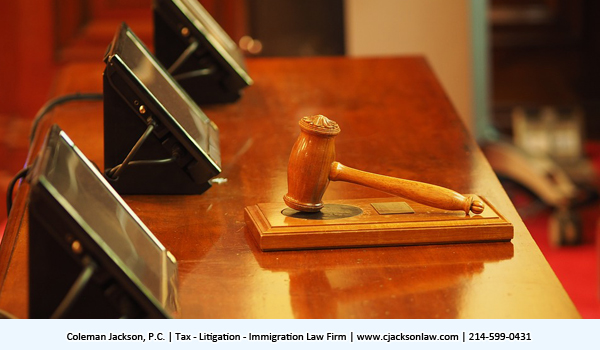By Coleman Jackson, Attorney & Certified Public Accountant
November 20, 2019
During this past summer, the Taxpayer First Act (“TFA”) became U.S. tax law. The U.S. Congress’ stated purpose of implementing the Taxpayer First Act was to modernize and improve the Internal Revenue Code of 1986. From a bird’s eye view, the following are three tax law changes that are among the more significant changes made to the Internal Revenue Code of 1986 by the Taxpayer First Act:
- The TFA established within the Internal Revenue Service an office known as the ‘Internal Revenue Service Independent Office of Appeals’ to be headed by a Chief of Appeals completely independent and reporting directly to the Commissioner of Internal Revenue. The Office of Appeals is designed to give taxpayers a path to resolution of their disputes with the IRS in the administrative process without the need for costly tax litigation. Any taxpayer in receipt of a notice of deficiency authorized under Internal Revenue Code section 6212 may request referral to the Internal Revenue Service Independent Office of Appeals. Individuals and businesses in tax disputes with the IRS can request and obtain their IRS case files in advance of their appearing at an office of appeals conference in defense of their position. This would permit the taxpayers to school themselves on the applicable law and marshal the facts in support of their tax return position. Moreover taxpayers will have the right to have their tax cases heard by an independent decision maker and the right to protest adverse IRS decisions against them, including but not limited to, the IRS rejection of their request to go to the Independent Office of Appeals. The taxpayer will have certain due process rights in the conduct of the Office of Appeals and the dispute resolution procedures. Finally, the TFA provides that the IRS Independent Office of Appeals process will enjoy increased Congressional Oversight since the IRS Commissioner must submit annual reports to Congress under the TFA.
- The TFA modifies Internal Revenue Code Section 6015 with respect to Equitable Relief from Joint Liability, such as, the joint and severable liability associated with taxpayers signing a tax return with a spouse. The U.S. Tax Court now have the right to review de novo the administrative record established at the time of the IRS determination on the taxpayers innocent spouse relief or other equitable relief claim. Under the TFA the Tax Court also can consider any additional newly discovered or previously unavailable evidence. Equitable Relief cases are to be decided based on all the facts and circumstances. Federal tax law governing equitable relief has always established certain limitations both in fact and time that are not removed or modified by the TFA. The TFA changes impacting equitable relief claims apply to pending cases filed before this summer and all future equitable relief cases.
- The TFA modifies Internal Revenue Code Section 6503 with respect to IRS Issuance of Designated Summons. First the issuance of such summons must now be preceded by a review and written approval by the Commissioner of the relevant operating division of the Internal Revenue Service and Chief Counsel. Moreover the burden is on the IRS to establish in the court proceeding that reasonable requests were made for the information forming the basis of the summons. Taxpayers defending summons in court have due process rights to present counter argument and evidence to the contrary.
These are only three of the changes to tax law pursuant to the Taxpayer First Act (“TFA”); there are other significant changes as well. Watch our future blog posts which could deal with the IRS implementation of the TFA; Internal Revenue Service Independent Office of Appeals developments under the TFA; and the federal court’s interpretations of the TFA.
This law blog is written by the Taxation | Litigation | Immigration Law Firm of Coleman Jackson, P.C. for educational purposes; it does not create an attorney-client relationship between this law firm and its reader. You should consult with legal counsel in your geographical area with respect to any legal issues impacting you, your family or business.
Coleman Jackson, P.C. | Taxation, Litigation, Immigration Law Firm | English (214) 599-0431 | Spanish (214) 599-0432




